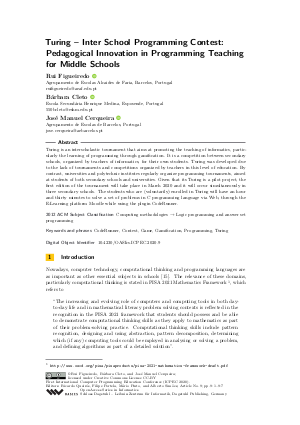Turing - Inter School Programming Contest: Pedagogical Innovation in Programming Teaching for Middle Schools
Authors
Rui Figueiredo  ,
Bárbara Cleto
,
Bárbara Cleto  ,
José Manuel Cerqueira
,
José Manuel Cerqueira 
-
Part of:
Volume:
First International Computer Programming Education Conference (ICPEC 2020)
Part of: Series: Open Access Series in Informatics (OASIcs)
Part of: Conference: International Computer Programming Education Conference (ICPEC) - License:
 Creative Commons Attribution 3.0 Unported license
Creative Commons Attribution 3.0 Unported license
- Publication Date: 2020-06-15
File

PDF
OASIcs.ICPEC.2020.9.pdf
- Filesize: 326 kB
- 7 pages
Document Identifiers
Subject Classification
ACM Subject Classification
- Computing methodologies → Logic programming and answer set programming
Keywords
- CodeRunner
- Contest
- Game
- Gamification
- Programming
- Turing
Metrics
- Access Statistics
-
Total Accesses (updated on a weekly basis)
0Document
0Metadata
Abstract
Turing is an interscholastic tournament that aims at promoting the teaching of informatics, particularly the learning of programming through gamification. It is a competition between secondary schools, organized by teachers of informatics, for their own students. Turing was developed due to the lack of tournaments and competitions organized by teachers in this level of education. By contrast, universities and polytechnic institutes regularly organize programming tournaments, aimed at students of both secondary schools and universities. Given that its Turing is a pilot project, the first edition of the tournament will take place in March 2020 and it will occur simultaneously in three secondary schools. The students who are (voluntarily) enrolled in Turing will have an hour and thirty minutes to solve a set of problems in C programming language via Web, through the E-Learning platform Moodle while using the plugin CodeRunner.
Cite As Get BibTex
Rui Figueiredo, Bárbara Cleto, and José Manuel Cerqueira. Turing - Inter School Programming Contest: Pedagogical Innovation in Programming Teaching for Middle Schools. In First International Computer Programming Education Conference (ICPEC 2020). Open Access Series in Informatics (OASIcs), Volume 81, pp. 9:1-9:7, Schloss Dagstuhl – Leibniz-Zentrum für Informatik (2020)
https://doi.org/10.4230/OASIcs.ICPEC.2020.9
BibTex
@InProceedings{figueiredo_et_al:OASIcs.ICPEC.2020.9,
author = {Figueiredo, Rui and Cleto, B\'{a}rbara and Cerqueira, Jos\'{e} Manuel},
title = {{Turing - Inter School Programming Contest: Pedagogical Innovation in Programming Teaching for Middle Schools}},
booktitle = {First International Computer Programming Education Conference (ICPEC 2020)},
pages = {9:1--9:7},
series = {Open Access Series in Informatics (OASIcs)},
ISBN = {978-3-95977-153-5},
ISSN = {2190-6807},
year = {2020},
volume = {81},
editor = {Queir\'{o}s, Ricardo and Portela, Filipe and Pinto, M\'{a}rio and Sim\~{o}es, Alberto},
publisher = {Schloss Dagstuhl -- Leibniz-Zentrum f{\"u}r Informatik},
address = {Dagstuhl, Germany},
URL = {https://drops.dagstuhl.de/entities/document/10.4230/OASIcs.ICPEC.2020.9},
URN = {urn:nbn:de:0030-drops-122961},
doi = {10.4230/OASIcs.ICPEC.2020.9},
annote = {Keywords: CodeRunner, Contest, Game, Gamification, Programming, Turing}
}
Author Details
References
- Marcelo Claro. Badges no Moodle - Gamification - Moodle Livre, 2014. URL: https://www.moodlelivre.com.br/tutoriais-e-dicas/potal/tutoriais-e-dicas-moodle/badges-no-moodle-gamification.
- Marcelo Claro. Configurar Condicionais no Moodle - Moodle Livre, 2016. URL: https://www.moodlelivre.com.br/tutoriais-e-dicas/1606-configurar-condicionaisno-moodle.
-
Ole-Johan Dahl, Edsger Wybe Dijkstra, and Charles Antony Richard Hoare. Structured programming. Academic Press Ltd., 1972.

-
Sebastian Deterding, Dan Dixon, Rilla Khaled, and Lennart Nacke. From game design elements to gamefulness: defining" gamification". In Proceedings of the 15th international academic MindTrek conference: Envisioning future media environments, pages 9-15, 2011.

-
Anabela Gomes, Joana Henriques, and António Mendes. Uma proposta para ajudar alunos com dificuldades na aprendizagem inicial de programaç~ao de computadores. Educaç~ao, Formaç~ao & Tecnologias-ISSN 1646-933X, 1(1):93-103, 2008.

-
Pedro Guerreiro. A mesma velha quest~ao: como ensinar programaç~ao? Mexico City: UNAM, 1986.

-
Richard Lobb and Jenny Harlow. Coderunner: A tool for assessing computer programming skills. ACM Inroads, 7(1):47-51, 2016.

-
Jorge Adolfo David Castro Monteiro. Ludificaç~ao do ensino da programaç~ao: Um caso de estudo, 2017.

-
Stamatios Papadakis and Michail Kalogiannakis. Using gamification for supporting an introductory programming course. the case of classcraft in a secondary education classroom. In Interactivity, Game Creation, Design, Learning, and Innovation, pages 366-375. Springer, 2017.

-
Marc Prensky. Digital game-based learning. Computers in Entertainment (CIE), 1(1):21-21, 2003.

-
Yizhou Qian and James Lehman. Students’ misconceptions and other difficulties in introductory programming: A literature review. ACM Transactions on Computing Education (TOCE), 18(1):1-24, 2017.

-
Ricardo Queirós and José Paulo Leal. Ensemble: An innovative approach to practice computer programming. In Innovative Teaching Strategies and New Learning Paradigms in Computer Programming, pages 173-201. IGI Global, 2015.

-
Mitchel Resnick. Edutainment? no thanks. i prefer playful learning. Associazione Civita Report on Edutainment, 14:1-4, 2004.

-
Sónia Rolland Sobral and Pedro Cravo Pimenta. O ensino da programaç~ao: exercitar a distância para combate às dificuldades, 2009.

-
Seyyed Meisam Taheri, Minoru Sasaki, Jiangcheng Oliver Chu, and Harrison Thuku Ngetha. A study of teaching problem solving and programming to children by introducing a new programming language. The international journal of e-learning and educational technologies in the digital media (IJEETDM), 2(1):31-36, 2016.

-
Paula Tavares, Elsa Gomes, Pedro Henriques, and Maria Jo~ao Pereira. Técnicas para aumentar o envolvimento dos alunos na aprendizagem da programaç~ao. In VII Congresso Mundial de Estilos de Aprendizagem, CMEA'2016, pages 1565-1577. Instituto Politécnico de Bragança, 2016.

-
Zahid Ullah, Adidah Lajis, Mona Jamjoom, Abdulrahman Altalhi, Abdullah Al-Ghamdi, and Farrukh Saleem. The effect of automatic assessment on novice programming: Strengths and limitations of existing systems. Computer Applications in Engineering Education, 26(6):2328-2341, 2018.

-
Elena Verdú, Luisa M Regueras, María J Verdú, José P Leal, Juan P de Castro, and Ricardo Queirós. A distributed system for learning programming on-line. Computers & Education, 58(1):1-10, 2012.

-
Nelson Zagalo and Dionisia Laranjeiro. Brinquedos e jogos digitais para o jardim de infância. 4. o Encontro sobre Jogos e Mobile Learning, 2018.

-
Michael Zyda. From visual simulation to virtual reality to games. Computer, 38(9):25-32, 2005.

